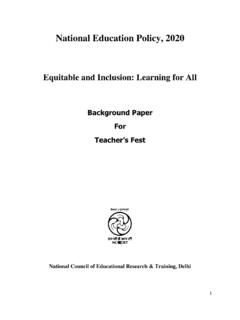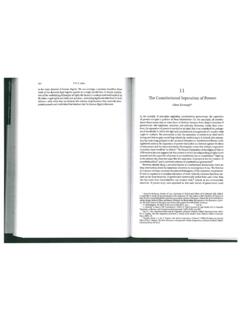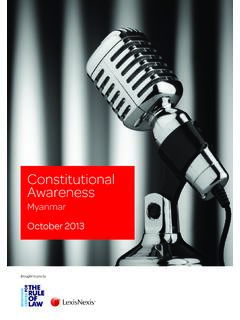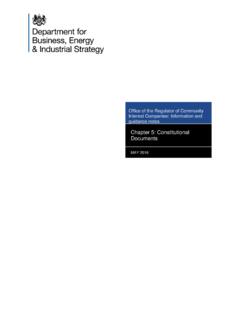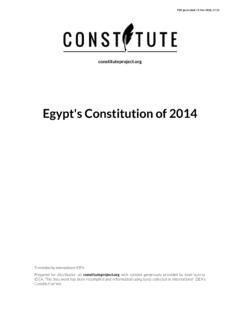Transcription of THE CONSTITUTION (SEVENTY-FOURTH AMENDMENT) ACT, …
1 THE CONSTITUTION (SEVENTY-FOURTH AMENDMENT) ACT, 1992 Statement of Objects and Reasons appended to the CONSTITUTION (Seventy-third Amendment) Bill, 1991 which was enacted as the CONSTITUTION (Seventy-fourth Amendment) Act, 1992 STATEMENT OF OBJECTS AND REASONSIn many States local bodies have become weak and ineffective onaccount of a variety of reasons, including the failure to hold regularelections, prolonged supersessions and inadequate devolution ofpowersand functions. As a result, Urban Local bodies are not able toperform effectively as vibrant democratic units of Having regard to these inadequacies, it is considered necessarythat provisions relating to Urban Local bodies are incorporated in theConstitution particularly for-(i) putting on a firmer footing the relationship between the StateGovernment and the Urban Local bodies with respect to-(a) the functions and taxation powers; and(b) arrangements for revenue sharing;(ii) Ensuring regular conduct of elections;(iii) ensuring timely elections in the case of supersession; and(iv) providing adequate representation for the weaker sections likeScheduled Castes, Scheduled Tribes and Accordingly, it is proposed to add a new part relating to theUrban Local bodies in the CONSTITUTION to provide for-(a) CONSTITUTION of three types of Municipalities:(i) Nagar Panchayats for areas in transition from a rural area tourban area.
2 (ii) Municipal Councils for smaller urban areas;(iii) Municipal Corporations for larger urban broad criteria for specifying the said areas is being provided inthe proposed article 243-0;(b) composition of Municipalities, which will be decided by theLegislature of a State, having the following features:(i) persons to be chosen by direct election;(ii) representation of Chairpersons of Committees, if any, at wardor other levels in the Municipalities;(iii) representation of persons having special knowledge or experienceof Municipal Administration in Municipalities (without voting rights);(c) election of Chairpersons of a Municipality in the mannerspecified in the State law;(d) CONSTITUTION of Committees at ward level or other level or levelswithin the territorial area of a Municipality as may be provided inthe State law;(e) reservation of seats in every Municipality-(i) for Scheduled Castes and Scheduled Tribes in proportion to theirpopulation of which not less than one-third shall be for women;(ii) for women which shall not less than one-third of the total numberof seats;(iii) in favour of backward class of citizens if so provided by theLegislature of the State;(iv) for Scheduled Castes, Scheduled Tribes and women in the office ofChairpersons as may be specified in the State law;(f) fixed tenure of 5 years for the Municipality and re-electionwithin six months of end of tenure.
3 If a Municipality is dissolvedbefore expiration of its duration, elections to be held within aperiod of six months of its dissolution;(g) devolution by the State Legislature of powers and responsibilitiesupon the Municipalities with respect to preparation of plans foreconomic development and social justice, and for the implementation ofdevelopment schemes as may be required to enable them to function asinstitutions of self-government;(h) levy of taxes and duties by Municipalities, assigning of suchtaxes and duties to Municipalities by State Governments and for makinggrants-in-aid by the State to the Municipalities as may be provided inthe State law;(i) a Finance Commission to review the finances of the Municipalitiesand to recommend principles for-(1) determining the taxes which may be assigned to the Municipalities;(2) Sharing of taxes between the State and Municipalities;(3) grants-in-aid to the Municipalities from the Consolidated Fund ofthe State;(j) audit of accounts of the Municipal Corporations by the Comptrollerand Auditor-General of India and laying of reports before theLegislature of the State and the Municipal Corporation concerned;(k) making of law by a State Legislature with respect to elections tothe Municipalities to be conducted under the superintendence,direction and control of the chief electoral officer of the State;(l) application of the provisions of the Bill to any Union territoryor part thereof with such modifications as may be specified by thePresident;(m) exempting Scheduled areas referred to in clause (1), and tribalareas referred to in clause (2), of article 244, from the applicationof the provisions of the Bill.
4 Extension of provisions of the Bill tosuch areas may be done by Parliament by law;(n) disqualifications for membership of a Municipality;(o) bar of jurisdiction of Courts in matters relating to elections tothe The Bill seeks to achieve the aforesaid DELHI; SHEILA 11th September, 1991. THE CONSTITUTION (SEVENTY-FOURTH AMENDMENT) ACT, 1992 ACT, 1992 [20th April, 1993.]An Act further to amend the CONSTITUTION of it enacted by Parliament in the Forty-third Year of the Republic ofIndia as follows:-1. Short title and (1) This Act may be called theConstitution (Seventy-fourth Amendment) Act, 1992.(2) It shall come into force on such date_681 as the CentralGovernment may, by notification in the Official Gazette, Insertion of new Part Part IX of the CONSTITUTION , thefollowing Part shall be inserted, namely:- `PART IXA THE MUNICIPALITIES243P.
5 This Part, unless the context otherwiserequires,-(a) "Committee" means a Committee constituted under article 243S;(b) "district" means a district in a State;(c) "Metropolitan area" means an area having a population of ten lakhsor more, comprised in one or more districts and consisting of two ormore Municipalities or Panchayats or other contiguous areas, specifiedby the Governor by public notification to be a Metropolitan area forthe purposes of this Part;(d) "Municipal area" means the territorial area of a Municipality asis notified by the Governor;(e) "Municipality" means an institution of self-government constitutedunder article 243Q;(f) "Panchayat" means a Panchayat constituted under article 243B;(g) "population" means the population as ascertained at the lastpreceding census of which the relevant figures have been CONSTITUTION of (1) There shall be constitutedin every State,-(a) a Nagar Panchayat (by whatever name called) for a transitionalarea, that is to say, an area in transition from a rural area to anurban area;(b) a Municipal Council for a smaller urban area; and(c) a Municipal Corporation for a larger urban area,in accordance with the provisions of this Part:Provided that a Municipality under this clause may not be constitutedin such urban area or part thereof as the Governor may, having regardto the size of the area and the municipal services being provided orproposed to be provided by an industrial establishment in that areaand such other factors as he may deem fit, by public notification,specify to be an industrial township.
6 (2) In this article, "a transitional area", "a smaller urban area" or"a larger urban area" means such area as the Governor may, havingregard to the population of the area, the density of the populationtherein, the revenue generated for local administration, thepercentage of employment in non-agricultural activities, the economicimportance or such other factors as he may deem fit, specify by publicnotification for the purposes of this Composition of (1) Save as provided in clause(2), all the seats in a Municipality shall be filled by persons chosenby direct election from the territorial constituencies in theMunicipal area and for this purpose each Municipal area shall bedivided into territorial constituencies to be known as wards.(2) The Legislature of a State may, by law, provide-(a) for the representation in a Municipality of-(i) persons having special knowledge or experience in Municipaladministration;(ii) the members of the House of the People and the members of theLegislative Assembly of the State representing constituencies whichcomprise wholly or partly the Municipal area;(iii) the members of the Council of States and the members of theLegislative Council of the State registered as electors within theMunicipal area;(iv) the Chairpersons of the Committees constituted under clause (5)of article 243S:Provided that the persons referred to in paragraph (i) shall not havethe right to vote in the meetings of the Municipality.
7 (b) the manner of election of the Chairperson of a CONSTITUTION and composition of Wards Committees, (1)There shall be constituted Wards Committees, consisting of one or morewards, within the territorial area of a Municipality having apopulation of three lakhs or more.(2) The Legislature of a State may, by law, make provision withrespect to-(a) the composition and the territorial area of a Wards Committee;(b) the manner in which the seats in a Wards Committee shall befilled.(3) A member of a Municipality representing a ward within theterritorial area of the Wards Committee shall be a member of thatCommittee.(4) Where a Wards Committee consists of-(a) one ward, the member representing that ward in the Municipality;or(b) two or more wards, one of the members representing such wards inthe Municipality elected by the members of the Wards Committee,shall be the Chairperson of that Committee.(5) Nothing in this article shall be deemed to prevent the Legislatureof a State from making any provision for the CONSTITUTION ofCommittees in addition to the Wards Reservation of (1) Seats shall be reserved for theScheduled Castes and the Scheduled Tribes in every Municipally and thenumber of seats so reserved shall bear, as nearly as may be, the sameproportion to the total number of seats to be filled by directelection in that Municipality as the population of the ScheduledCastes in the Municipal area or of the Scheduled Tribes in theMunicipal area bears to the total population of that area and suchseats may be allotted by rotation to different constituencies in aMunicipality.
8 (2) Not less than one-third of the total number of seats reservedunder clause (1) shall be reserved for women belonging to the Sche-duled Castes or, as the case may be, the Scheduled Tribes.(3) Not less than one-third (including the number of seats reservedfor women belonging to the Scheduled Castes and the Scheduled Tribes)of the total number of seats to be filled by direct election in everyMunicipality shall be reserved for women and such seats may beallotted by rotation to different constituencies in a Municipality.(4) The officers of Chairpersons in the Municipalities shall bereserved for the Scheduled Castes, the Scheduled Tribes and women insuch manner as the Legislature of a State may, by law, provide.(5) The reservation of seats under clauses (1) and (2) and thereservation of offices of Chairpersons (other than the reservation forwomen) under clause (4) shall cease to have effect on the expirationof the period specified in article 334.
9 (6) Nothing in this Part shall prevent the Legislature of a State frommaking any provision for reservation of seats in any Municipality oroffices of Chairpersons in the Municipalities in favour of backwardclass of Duration of Municipalities, (1) Every Municipality,unless sooner dissolved under any law for the time being in force,shall continue for five years from the date appointed for its firstmeeting and no longer:Provided that a Municipality shall be given a reasonable opportunityof being heard before its dissolution.(2) No amendment of any law for the time being in force shall have theeffect of causing dissolution of a Municipality at any level, which isfunctioning immediately before such amendment, till the expiration ofits duration specified in clause (1).(3) An election to constitute a Municipality shall be completed,-(a) before the expiry of its duration specified in clause (1);(b) before the expiration of a period of six months from the date ofits dissolution:Provided that where the remainder of the period for which thedissolved Municipality would have continued is less than six months,it shall not be necessary to hold any election under this clause forconstituting the Municipality for such period.
10 (4) A Municipality constituted upon the dissolution of a Muni-cipality before the expiration of its duration shall continue only forthe remainder of the period for which the dissolved Municipality wouldhave continued under clause (1) had it not been so Disqualifications for (1) A person shall bedisqualified for being chosen as, and for being, a member of aMunicipality-(a) if he is so disqualified by or under any law for the time being inforce for the purposes of elections to the Legislature of the Stateconcerned:Provided that no person shall be disqualified on the ground that he isless than twenty-five years of age, if he has attained the age oftwenty-one years;(b) if he is so disqualified by or under any law made by theLegislature of the State.(2) If any question arises as to whether a member of a Municipalityhas become subject to any of the disqualifications mentioned in clause(1), the question shall be referred for the decision of such authorityand in such manner as the Legislature of a State may, by law, Powers, authority and responsibilities of Municipalities, to the provisions of this CONSTITUTION , the Legislature of aState may, by law, endow-(a) the Municipalities with such powers and authority as may benecessary to enable them to function as institutions ofself-government and such law may contain provisions for the devolutionof powers and responsibilities upon Municipalities, subject to suchconditions as may be specified therein, with respect to-(i) the preparation of plans for economic development and socialjustice.



